
Narrative Culture
Scope & Guideline
Bridging Disciplines Through the Study of Narrative
Introduction
Aims and Scopes
- Interdisciplinary Approaches to Narrative:
The journal embraces a variety of disciplines, including anthropology, folklore studies, literature, and cultural studies, encouraging diverse methodologies to examine narrative practices. - Exploration of Temporalities in Narratives:
A consistent focus on how narratives interact with concepts of time, including memory, history, and the impact of contemporary events, is evident across many publications. - Cultural and Ethnic Narratives:
Narrative Culture highlights stories from diverse cultural backgrounds, examining how narratives reflect cultural identities, practices, and historical experiences. - Narratives of Place and Space:
The journal investigates how narratives are tied to specific geographical and social contexts, exploring themes of migration, displacement, and local histories. - Environmental and Non-Human Narratives:
An emerging focus on how narratives relate to the environment and non-human entities, such as plants and animals, showcases a broader understanding of narrative beyond human experiences.
Trending and Emerging
- Pandemic Narratives and Temporalities:
The COVID-19 pandemic has prompted an increase in research focusing on the narratives of time during crises, exploring how individuals and communities articulate their experiences and memories in altered temporal landscapes. - Environmental Narratives and Agency:
There is a growing emphasis on narratives that highlight the relationship between humans and the environment, particularly stories that give voice to non-human entities and examine ecological agency. - Migration and Transnational Narratives:
As global migration continues to rise, the journal is increasingly publishing works that explore the narratives of migrants, their experiences, and the complexities of identity in transnational contexts. - Digital Narratives and New Media:
The impact of digital technology on storytelling practices is gaining traction, with emerging research examining how narratives are constructed and disseminated through digital platforms. - Narratives of Resilience and Resistance:
Themes focusing on resilience in the face of adversity, particularly within marginalized communities, are becoming more prominent, highlighting the power of narrative as a tool for social change and empowerment.
Declining or Waning
- Traditional Folklore Studies:
Although folklore remains a part of the journal's focus, there has been a noticeable decline in publications centered strictly on traditional folklore narratives, potentially overshadowed by contemporary narrative practices. - Static Historical Narratives:
Themes that approach history in a static or uncritical manner appear to be less frequent, indicating a shift towards more dynamic interpretations of history that engage with narratives of resilience and agency. - Narrowly Defined Gender Narratives:
While gender remains a critical aspect of narrative analysis, discussions that confine gender to binary perspectives or traditional roles are declining, making way for more nuanced explorations of gender fluidity and intersectionality.
Similar Journals

SCANDINAVICA
Elevating Critical Discourse in Cultural Studies and Literary Theory.SCANDINAVICA, published by the University of East Anglia, is a pivotal peer-reviewed journal in the fields of Cultural Studies and Literature and Literary Theory. With an ISSN of 0036-5653, the journal offers a platform for scholars and researchers to disseminate innovative research and critical insights from 2002 through 2020 and will continue to do so until 2024. Although it is not currently an open-access journal, its commitment to extensive academic discourse is reflected in its rank, with a reputable Q4 in Cultural Studies and Q3 in Literature and Literary Theory within the 2023 category quartiles. With Scopus rankings placing it in the 2nd percentile for Literature and Literary Theory and an even more esteemed 1st percentile for Cultural Studies, SCANDINAVICA stands out as an influential resource for those engaged in the vibrant intersections of cultural narratives and literary analysis. This journal serves to elevate critical discussions and foster a deeper understanding of Scandinavian cultural and literary discourses, making it an essential read for academics, students, and anyone vested in these multidimensional fields.
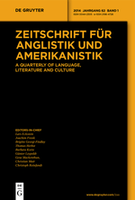
ZEITSCHRIFT FUR ANGLISTIK UND AMERIKANISTIK
Exploring the Depths of English and American StudiesZEITSCHRIFT FUR ANGLISTIK UND AMERIKANISTIK is a distinguished academic journal dedicated to the fields of English studies and American studies, published by Walter de Gruyter GmbH. Nestled in Germany, the journal has carved a niche for itself since its inception, offering a vital platform for scholars interested in the nuances of linguistics, literature, and cultural studies. Although it currently operates without an open access model, its rich repository of research is invaluable for those keen to explore the historical and contemporary intersections of English and American literature. With an ongoing commitment to publishing high-quality, peer-reviewed articles, the journal has garnered attention in Scopus rankings, receiving recognition in both the Q3 and Q4 quartiles for literature and linguistic studies respectively. As a hub for innovative research, ZEITSCHRIFT FUR ANGLISTIK UND AMERIKANISTIK encourages robust dialogue and scholarly exploration, making it an essential resource for researchers, professionals, and students alike in the ever-evolving landscape of linguistic and literary theory.
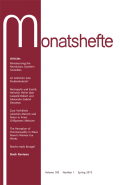
Monatshefte
Elevating Academic Dialogue in German StudiesMonatshefte is a prestigious academic journal published by the University of Wisconsin Press, dedicated to fostering scholarly discourse in the field of German Studies. With its ISSN 0026-9271 and E-ISSN 1934-2810, Monatshefte serves as a vital platform for researchers and students, offering peer-reviewed articles that delve into literature, culture, and linguistics. The journal plays an essential role in advancing knowledge and understanding of German intellectual traditions, making it indispensable for anyone interested in the dynamics of German culture. Although it is not an Open Access publication, its rigorous selection of high-quality research articles ensures its impact within the academic community. For researchers aiming to stay at the forefront of German Studies, Monatshefte provides a wealth of insights and critical analyses, fostering enhanced academic dialogue and innovation.

CULTURE & PSYCHOLOGY
Illuminating the Dynamics of Culture and CognitionCULTURE & PSYCHOLOGY is a premier journal published by SAGE PUBLICATIONS LTD, dedicated to advancing the understanding of psychological processes within cultural contexts. With an ISSN of 1354-067X, this influential journal has been a cornerstone in the fields of Anthropology, Cultural Studies, Social Psychology, and Sociology since its inception in 1995. Notably, it holds prestigious Q1 rankings in both Anthropology and Cultural Studies, reflecting its high impact and substantial contribution to these disciplines. With a strong emphasis on interdisciplinary research, it invites rigorous empirical studies, theoretical discussions, and cross-cultural analyses that illuminate the interplay between culture and psychological phenomena. Readers can explore valuable insights without open access barriers, benefiting from a wealth of knowledge attested by its 2023 Scopus percentile rankings, ranging from the 40th to the 89th percentile in its respective categories. As such, CULTURE & PSYCHOLOGY remains an essential resource for researchers, professionals, and students eager to deepen their understanding in this dynamic and evolving field.
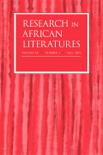
RESEARCH IN AFRICAN LITERATURES
Unveiling the Rich Tapestry of African TextsRESEARCH IN AFRICAN LITERATURES is a prestigious peer-reviewed journal published by Indiana University Press, dedicated to the critical exploration of African literary traditions, cultures, and texts. With an ISSN of 0034-5210 and an E-ISSN of 1527-2044, this journal stands out in the field of literature and literary theory, currently ranking in the 80th percentile of its category according to Scopus, making it a significant platform for scholars and researchers alike. Since its establishment, the journal has evolved through converged volumes from 2002 to 2024, consistently fostering innovative discourse and interdisciplinary approaches that illuminate the complexities of African narratives. Although it does not offer open access, the journal is integral for anyone engaged in African studies, providing critical insights that are essential for understanding the broader implications of literature within diverse cultural contexts. The journal's commitment to high standards of scholarship is reflected in its Q3 quartile ranking and its influential contribution to contemporary literary dialogue.
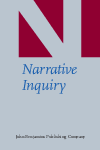
NARRATIVE INQUIRY
Engaging Minds with the Richness of Narrative InquiryNARRATIVE INQUIRY, published by John Benjamins Publishing Co, is a leading academic journal in the fields of education, history, literature, and social sciences, with an ISSN of 1387-6740 and E-ISSN 1569-9935. Based in the Netherlands, this journal showcases a rich tapestry of scholarly work that embraces the complexities of narrative methods and their implications across various disciplines. Since its inception in 1998 and continuing through 2024, NARRATIVE INQUIRY has consistently contributed to its fields, achieving an impressive Q1 ranking in both Literature and Literary Theory and History, highlighting its significance and impact within the academic community. With options for open access, it ensures that cutting-edge research is readily available to a global audience. The journal seeks to explore narrative as a research tool and to elucidate the narratives of social, educational, and historical phenomena, engaging scholars, students, and practitioners alike in a dialogue that advances understanding and innovation within these areas.

Fictions-Studi Sulla Narrativita
Bridging Tradition and Modernity in Storytelling.Fictions-Studi Sulla Narrativita, published by Fabrizio Serra Editore, is an esteemed academic journal dedicated to the exploration of narrative theory and its multifaceted applications within literature and the arts. Since its inception, the journal has become a vital platform for scholars, researchers, and students interested in the intricate structures and theoretical frameworks that underpin narrative forms. With ISSN 1721-3673 and E-ISSN 1724-045X, it aims to bridge contemporary literary discourse with historical perspectives, creating a comprehensive discourse on storytelling methodologies. Although the journal is categorized within the lower quartiles in Scopus rankings, it serves a crucial function in fostering academic dialogue and innovation among emerging voices in the field. The journal's recent convergence years, spanning 2019 to 2023, reflect a growing interest in narrative studies, emphasizing its relevance and responsiveness to current scholarly trends. As an essential resource for those engaged in the arts, humanities, and literary theory, Fictions-Studi Sulla Narrativita invites contributions that challenge conventional narratives and inspire new interpretations of text and storytelling.

Anclajes
Empowering Voices in Literature and LinguisticsAnclajes is a prominent academic journal dedicated to the fields of Cultural Studies, Linguistics, and Literature, published by the UNIV NACIONAL LA PAMPA, FAC CIENCIAS HUMANAS. With both print (ISSN 0329-3807) and electronic (E-ISSN 1851-4669) formats, the journal has embraced an Open Access model since 2010, greatly enhancing its accessibility and reach to a global audience. Based in Argentina, Anclajes provides a platform for innovative research and critical discourse, contributing significantly to the understanding of cultural phenomena and literary theories. In recent years, the journal has established itself with a Scopus rank placing it in the top 30% of Literature and Literary Theory and the top 57% of Cultural Studies, as indicated by its quartile rankings for 2023. With issues converging from 2012 to 2024, Anclajes continues to foster scholarly communication and serves as an essential resource for researchers, students, and professionals seeking to explore the dynamism of human culture and expression.
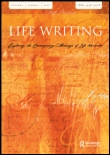
Life Writing
Fostering Interdisciplinary Insights into Life WritingLife Writing, published by Routledge Journals, Taylor & Francis Ltd, is a prestigious academic journal dedicated to the field of Literature and Literary Theory. With an impressive impact factor and listed in the top quartile (Q1) of its category, it ranks #91 out of 1106 in the Scopus database, placing it in the 91st percentile – a testament to its significant influence and reach within the academic community. Since its inception in 2004, Life Writing has provided a vital platform for scholars and practitioners to explore the nuances of life writing across various genres and cultures. The journal emphasizes critical and theoretical approaches while promoting innovative research, making it an essential resource for researchers, professionals, and students alike. With a commitment to advancing the discourse on autobiographical narratives, memoirs, and biographies, Life Writing fosters a rich, interdisciplinary dialogue that is crucial for understanding personal and collective identities in contemporary literature.
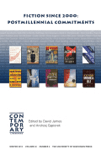
CONTEMPORARY LITERATURE
Fostering Critical Discourse in Modern LiteratureCONTEMPORARY LITERATURE, published by the prestigious University of Wisconsin Press, stands as a vital platform for scholars and enthusiasts within the field of literary studies. With its ISSN 0010-7484 and E-ISSN 1548-9949, this journal has established itself as a respected source of innovative research across various dimensions of literature and literary theory. Holding an impressive Q2 ranking in the 2023 category of Arts and Humanities, this publication not only reflects current trends but also fosters critical discourse around contemporary authors and movements from 2002 to 2024. Engaging articles submitted to CONTEMPORARY LITERATURE enhance our understanding of narrative forms and their cultural relevance, making it an essential read for academics, professionals, and students alike. While the journal is not open access, its impact within the literary community continues to grow, as evidenced by its Scopus rank of #616 out of 1106. For those dedicated to exploring the evolving landscape of literature, CONTEMPORARY LITERATURE is a must-have in one's scholarly toolkit.